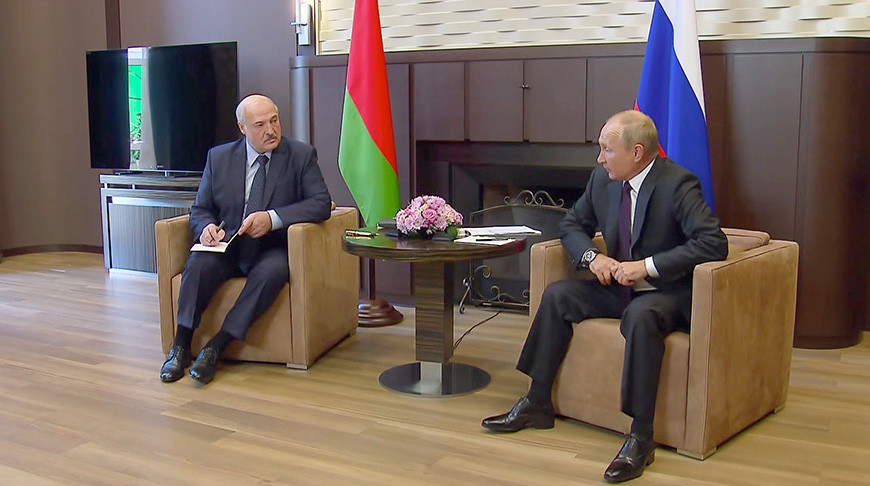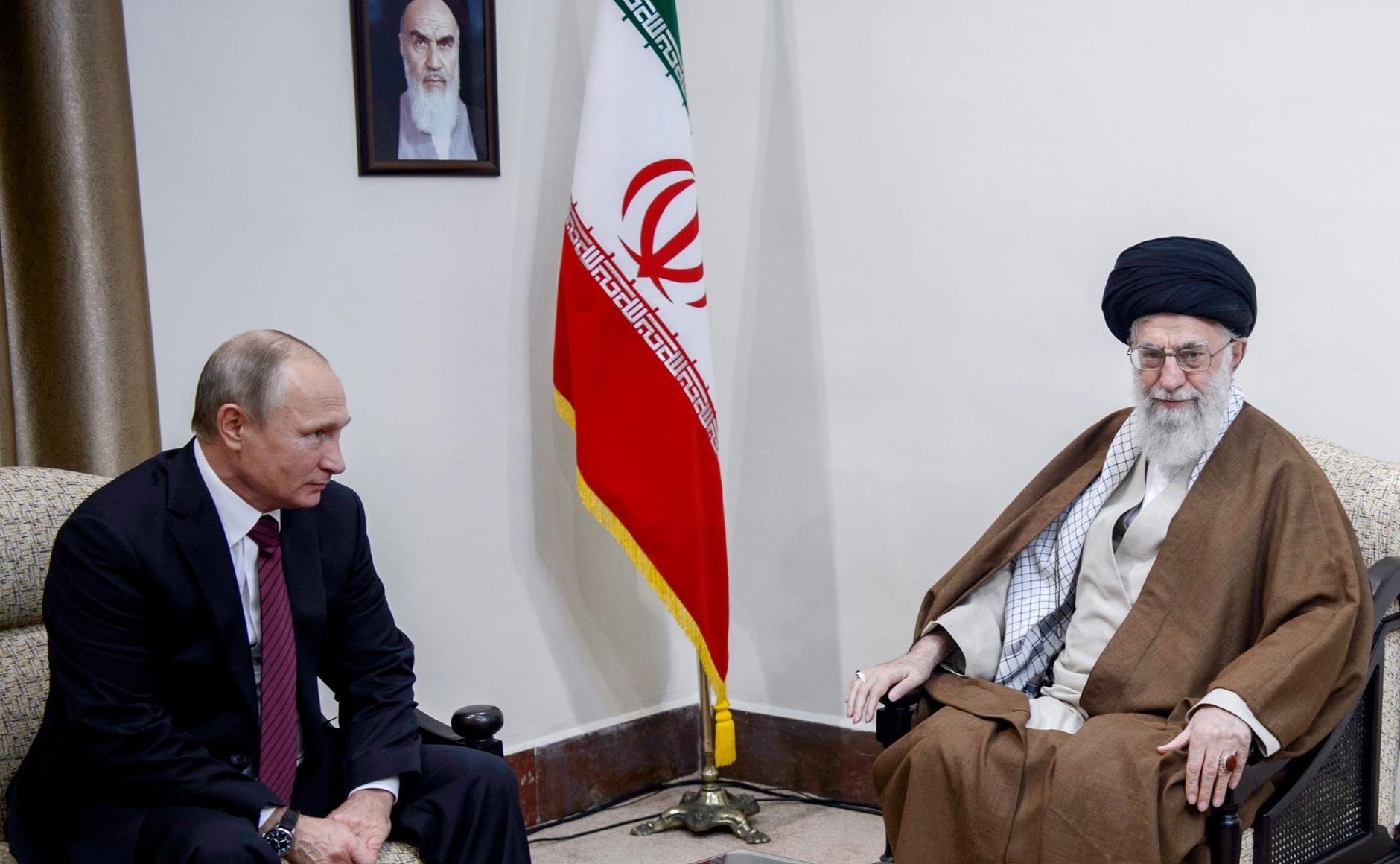
Lukashenka Holds His Own With Putin in Sochi (Part Two)
Lukashenka Holds His Own With Putin in Sochi (Part Two)
*To read Part One, please click here.
Russian President Vladimir Putin received his Belarusian counterpart Alyaksandr Lukashenka in Sochi on September 14 (see Part One). Putin emphasized that he had congratulated Lukashenka instantly on his reelection by telephone and in writing and that he was doing so again now in person. Putin praised Lukashenka for proceeding with constitutional changes: “an appropriate and timely initiative, a breakthrough in the development of Belarus’s political system.” Putin counseled an internal dialogue on a new constitution among Belarusians themselves, “without whispered advice from abroad [i.e., the West]” (RT, September 14). Belarus, indeed, presented a preliminary constitutional draft to the Organization for Security and Cooperation in Europe’s (OSCE) Permanent Council on August 28, not made public (RBC, September 8).
The Russian-Belarusian tactical military exercise Slavic Brotherhood 2020 (which in previous years had also involved Serbia) started also on September 14, at the Brest training range. This is a routine exercise, announced long in advance. Putin and his press secretary, Dmitry Peskov, however, made vague references to a new annual plan for Russian-Belarusian military “activities” (meropriatiya). These would be conducted alternately on Russian territory and Belarusian territory, in a stage-by-stage sequence, “practically every month.” The troops “would return to their permanent bases after each stage.” According to Peskov, “Setting up a Russian military base in Belarus was not considered. This matter is not on the agenda” (TASS, September 14).
Elaborating on Putin’s political messages, Peskov declared, “Lukashenka is the legitimate president of Belarus and, as such, the counterpart to President Putin.” This could not have been said more emphatically; and, along the same lines, “the actions of Belarusian law enforcement authorities are not a topic for discussion in the relations between Belarus and Russia.” Yet, the Kremlin is positioning itself as an impartial, even an entitled mediator among Belarusians, Peskov explained: “All people in Belarus, whether they agree or disagree with the results of elections, are citizens of our fraternal Belarus. We value and love them all” (TASS, September 14).
Lukashenka acted defensively vis-à-vis Putin during their introductory remarks for the media. He offered profuse thanks many times without specifying for what exactly. But he reduced his anti-Western geopolitical messaging to one perfunctory question: to why North Atlantic Treaty Organization (NATO) troops were exercising in Lithuania, near the Belarusian border (Russia Today, September 14).
The most revealing parts in Lukashenka’s remarks were, however, his omissions. He made no reference to the constitutional reform, the issue that held the top billing in Putin’s remarks preceding Lukashenka’s.
Nor did Lukashenka mention the “road maps” that Russia wants Belarus to sign in further development to the nominal Union State. In fact, Lukashenka only mentioned the Union State Treaty to recall that it was signed back in 1999, and that he had exchanged the instruments of ratification with a “young president Putin” in 2000.
He could have been expected on this occasion (of all occasions) to mention his recent idea about diverting Belarusian export-import flows from Lithuania’s Klaipeda port toward Russia’s Ust-Luga. But Lukashenka did not bring this up, which could be another sign of regaining his composure.
Regarding the post-election protests, Lukashenka gave reassurance in his opening remarks that “nobody has yet crossed those red lines.” This choice of words may allude to Putin’s August 27 warning that Russian law enforcement personnel could deploy to Belarus if the protests “cross red lines.” Lukashenka’s statement amounts to certifying that they did not. And following the presidents’ closed-door session, Peskov announced that the units making up a reserve contingent of Russian law enforcement personnel (mainly the National Guard) assembled for that purpose near the border with Belarus would return to their permanent bases (Russia-1 TV, August 27; TASS, September 14).
Russian privatization of Belarusian state enterprises, mergers of Russian and Belarusian state corporations, or debt-for-assets schemes—which Moscow brings up from time to time as irritants in the dialogue—were deliberately left out this time. “Too early,” Peskov said. These matters will undoubtedly return to the agenda (see below). The current emphasis is on reversing the decline in the bilateral trade turnover.
The Russian side confirmed the imminent disbursal of a $1.5 billion loan to Belarus, partly to refinance past debt and partly to cover current expenses.
Opposition leader Sviatlana Tsikhanouska (Svetlana Tikhanovska), currently in Lithuania, reacted: “I want to remind Vladimir Putin: whatever the two of you agree in the Sochi meeting will not be legally valid. All agreements signed with the illegitimate Lukashenka will be reconsidered by the new authorities. I very much regret that you decided to conduct a dialogue with the dictator, instead of the Belarusian people” (Interfax, September 14).
Russia has designated Belarus as the first country to be supplied with the Russian-made COVID-19 vaccine. Russian Prime Minister Mikhail Mishustin announced this in Minsk on September 3, inspiring Belarusian Prime Minister Raman Halauchanka to volunteer for vaccination on the same day and actually to be vaccinated on September 7. The Russian side considers the possibility of outsourcing some phases of the vaccine production process to Belarus (Interfax, September 3, 7; TASS, September 14).
Mishustin along with Russia’s Energy Minister Aleksandr Novak had discussed the repayment of Belarus’s debt of some $350 million for Russian natural gas during their September 3 visit to Minsk. This and other perennial energy supply topics did not come up in the public part of the Sochi meeting.
Interviewed on the day of Lukashenka’s Sochi visit, Rosatom General Director Aleksei Likhachev said that Belarus’s Astravets nuclear power plant began loading the first reactor with nuclear fuel on August 8, and is expected to connect the first power bloc to Belarus’s electricity grid before the end of the current year. According to Likhachev, the International Atomic Energy Agency continuously monitors the plant. The project is financed by a $10 billion Russian state loan, at 3.3 percent annual interest (Ekho Moskvy, September 14).
The Kremlin will, in the near term, prioritize constitutional reform in Belarus and remaking its political system. A parliamentary republic—such as Russia seems to have in mind for Belarus—would be far less resistant to Russian demands for economic integration and closer military cooperation.


